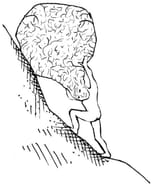Taking notes and reading 'for fun'
woj.jpg
md5: e528cc1e... 🔍

I'm a fifth of the way through Heart of Darkness and am realizing that I'm getting none of it. It's cool prose and imagery, and I think I see some common threads: ecological harm, darkness and shrouds, civilization as a costume, can't really name much more off the top of my head because I'm not that great of a reader. But I don't get it. It's kind of made me realize that I don't know what I'm doing.
I picked up heavier books to see what the pinnacle of literature looks like, and while I've enjoyed a lot of these books, I think the imagery, metaphor, and symbolism aspects of many books goes entirely over my head. I re-read Blood Meridian and I'm still not convinced that I actually 'got' it.
I've got some questions to help uncover more. Answer as many as you want:
1. What's your reading process like? What has and hasn't worked for you?
2. Is there a thread or lineage of common literary imagery that I'm missing? I know that the Bible is referenced by both Blood Meridian and Moby Dick, but I haven't read it, so I don't know. How long would such a thing take to cultivate, and how do I do it?
3. How do you read? What are you looking for? I just read like normal, keep track of the plot, and let the mental image conjure itself then pick out similarities between scenes. Am I doing something wrong?
4. How does one get better at reading serious literature beyond reading more? I have no problems with the language itself. Is it a matter of doing research beforehand? Re-reading? Re-reading after each chapter? Letting things digest or pondering the novel after you're done?
And lastly, a really important one, which I hope most of you will answer:
5. Do you take notes in your books? Do you have a system? Most of my note-taking eventually just becomes definitions for new words or translations. Is there a way to use this to enrich my reading?
Ultimately, I want to get more out of the books, so sharing any way that I can do that is appreciated.
I picked up heavier books to see what the pinnacle of literature looks like, and while I've enjoyed a lot of these books, I think the imagery, metaphor, and symbolism aspects of many books goes entirely over my head. I re-read Blood Meridian and I'm still not convinced that I actually 'got' it.
I've got some questions to help uncover more. Answer as many as you want:
1. What's your reading process like? What has and hasn't worked for you?
2. Is there a thread or lineage of common literary imagery that I'm missing? I know that the Bible is referenced by both Blood Meridian and Moby Dick, but I haven't read it, so I don't know. How long would such a thing take to cultivate, and how do I do it?
3. How do you read? What are you looking for? I just read like normal, keep track of the plot, and let the mental image conjure itself then pick out similarities between scenes. Am I doing something wrong?
4. How does one get better at reading serious literature beyond reading more? I have no problems with the language itself. Is it a matter of doing research beforehand? Re-reading? Re-reading after each chapter? Letting things digest or pondering the novel after you're done?
And lastly, a really important one, which I hope most of you will answer:
5. Do you take notes in your books? Do you have a system? Most of my note-taking eventually just becomes definitions for new words or translations. Is there a way to use this to enrich my reading?
Ultimately, I want to get more out of the books, so sharing any way that I can do that is appreciated.